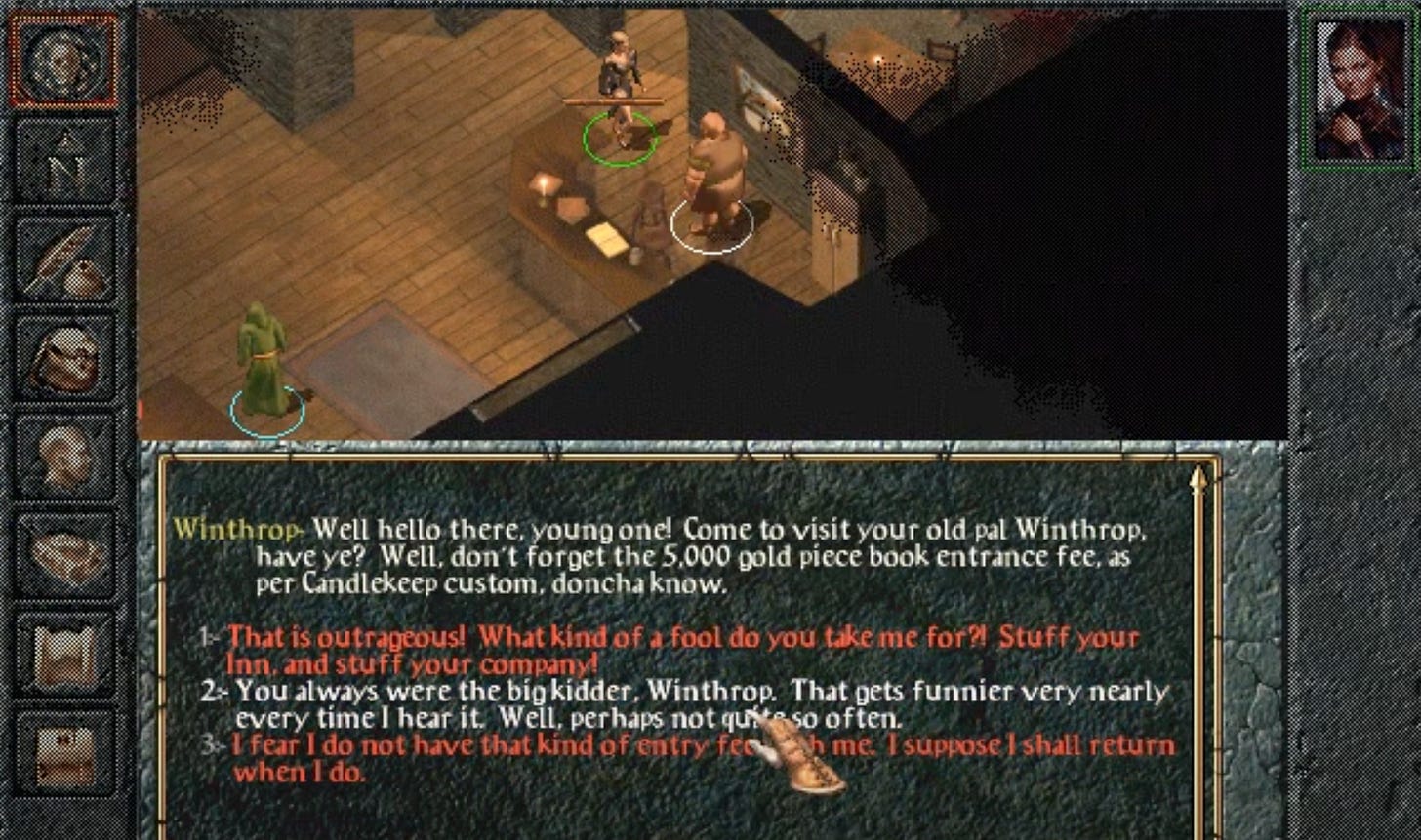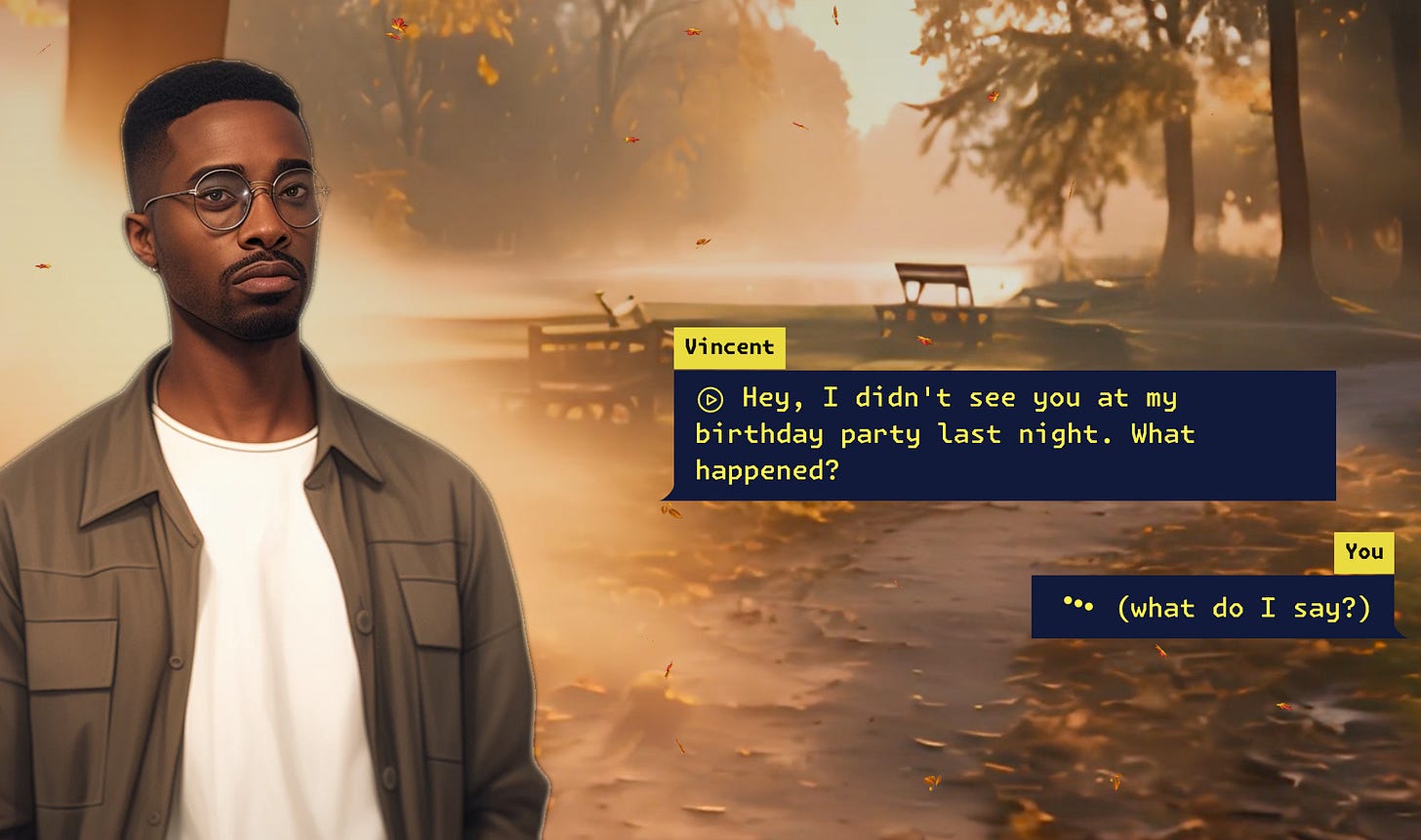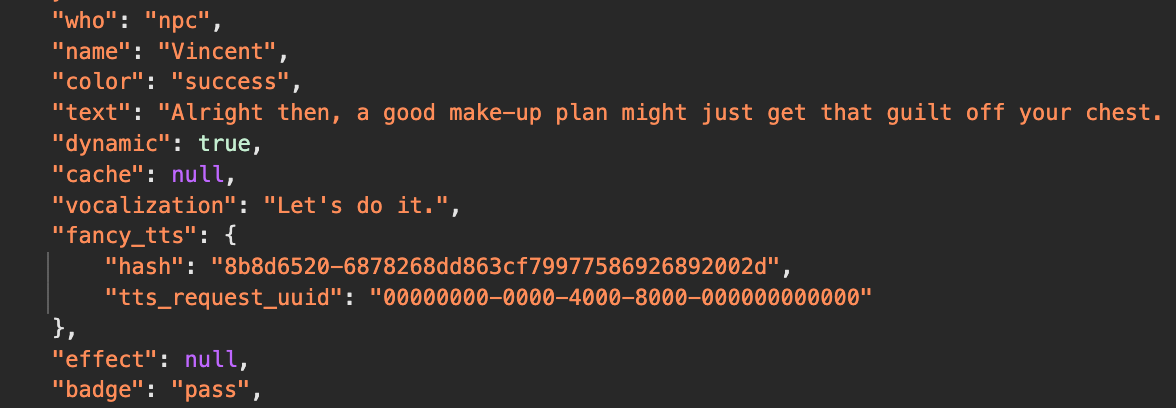Off the rails: "Talk to me, human" and the scriptless dialogue
🛤️ A gimmick or the future of game dialogue? Only time will tell
The first game that truly captured my imagination was the original Baldur's Gate, released in 1998.
The game was dialogue-heavy and I loved the dialogues. They were funny, thought-provoking and beautifully written. Playing the game I felt like I was sucked into a well-written fantasy novel.
Of course, these great dialogues were completely “on rails”: pre-written and baked into the game.
The future of gameplay dialogue?
What if the player could enter (or say, using their voice as input!) anything they like?
We could imagine a game that takes open-ended player input, and uses an LLM to evaluate it. This would be done with a pair of prompts. One prompt is visible to the user. The other prompt is secret (not visible to the player) and is used to evaluate the user response:
[Secret prompt] The player just ran into their friend Vincent. They player didn't show up at Vincent's party last night. The player says to Vincent: <PLAYER MESSAGE>
Evaluate whether Vincent is likely to feel better after hearing what the player said, respond with OK if yes and FAIL if no.
Talk to me, human
Oh, and we don't have to imagine a game written like this, because someone just made it :).
The screenshot above is from Talk to me Human, currently in paid early access. (I'm not affiliated with the game and not getting any incentive to write about it)
The game is cute and it runs directly in the browser. It's all built around the challenge of saying the right thing to navigate social situations.
It has a fun comedic-dystopian vibe: the main character has their cat confiscated and needs to improve their "social score” to get the cat back. The cat is one of the last non-robot pets on the planet so the stakes are pretty high 🔥.
How does it work?
The nice thing about games that run in the browser is that we can peek at their internal mechanics using the browser DevTools.
In this case, we can see that the voice recognition is happening locally in the browser (probably using the Web Speech API). The game then sends the user response to the server in text form.
Then the server is probably calling something like the OpenAI GPT API to evaluate the player response, makes the appropriate gameplay decisions and streams the results back to the browser:
Because the costly LLM compute is happening on the server, the game comes with a limit of "gameplay credits” as an anti-abuse measure.
Conclusion: not for introverts
The open-ended dialogue makes the game much harder: thinking of the right thing to say with the clock ticking is stressful and feels like hard work. This may ultimately limit the appeal of open dialogue in major game productions: people play games to relax and unwind.
Or maybe I’m just too much of an introvert :).
More on this
🎮 In 2023, a long-anticipated successor in the Baldur's Gate series was released. Baldur's Gate 3 improved many things over the original, but the dialogue mechanics remained the same: everything is hard-coded.
🔪 Death by AI, another game where the LLM drives the mechanics
In other news
👾 I spent some time expanding my map of Space Invader mosaics: it now covers almost all of the 4000+ mosaics in 80 cities/areas around the world
💰 How much does it cost to train a state-of-the-art LLM? Ben Evans: Databricks said it built its model for $10m, but I’ve seen guesses for Llama 3 of $100m or more - perhaps much more. Last week the founder of Anthropic suggested numbers of $1bn for next-generation models and $5bn or $10bn for 2025’s generation, simply on the theory that these models will keep getting better as they get bigger.
📝 John Cutler on the under-challenged pragmatists at work: They don't go "above and beyond" because they are inherently skeptical that it is worth it. They are very reliable, but to the point where they are conveniently (to them) invisible.
Postcard from Pancharevo 🇧🇬
I ended up running the trail run I signed up for in Pancharevo in Bulgaria. It was an amazing experience, the adrenaline of the run helped me forget about not feeling too well 💫.
Do more of what makes you feel alive,
– Przemek








Hey Przemek, thanks so much for trying out Talk to Me Human and writing this thoughtful piece about it! Great sleuthing on the internal mechanics :-)
Re: the introvert thing, this is such a good observation and one I'm still weighing in the design. I think right now the game works well as kind of a "party game" --- playing with friends, you can one-up each other, trying out more ridiculous excuses. But playing by yourself, it is for sure stressful, and the pressure to respond out loud and in time triggers actual social anxiety. As you say, it's not exactly relaxing. I haven't yet decided whether to try to optimize for both play scenarios, or lean towards just one.
Always happy to hear more feedback. And thanks again!